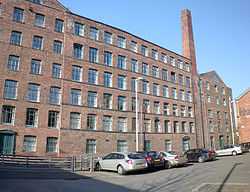Marshall's Mill

Marshall's Mill is a former flax spinning mill on Marshall Street in Holbeck, Leeds, West Yorkshire, England.
Marshall's Mill was part of a complex begun in 1791-92 by English industrial pioneer John Marshall. It was a six storey mill, drawing water from the nearby Hol Beck, with machines supplanting Yorkshire's previous cottage industry of hand driven spindles. Later, together with the adjacent Egyptian-style Temple Works, the complex employed over 2,000 factory workers. When it was completed it was considered to be one of the largest factories in the world, with 7,000 steam-powered spindles.
In the early years, child labour was employed. In 1832 Marshall's political opponents alleged that:
'In Mr Marshall's mill, a boy of 9 years of age was stripped to the skin, bound to an iron pillar, and mercilessly beaten with straps, until he fainted.'[1]
But other reports[2] claim that Marshall treated his workers better than most factory owners: overseers were forbidden to use corporal punishment to control the workers, and Marshall installed fans and attempted to regulate the temperature of the mill. In 1844, Marshall and a neighbouring engineering firm, Taylor, Wordsworth and Co broke new ground by organising an away weekend in Liverpool for their workers, a novelty which caused even the editor of the normally liberal Leeds Mercury[3] some concern:
'Entirely approving of excursions for the working class, and with the kindest feelings towards the workmen of Messrs Marshall and Messrs Taylor and Wordsworth, we would express our earnest hope that the Sunday spent in Liverpool may not in any respect be spent in a manner unbecoming the day ... There are many excellent men among the above bodies of workmen, and great responsibility will rest upon them for the issue of this new and somewhat doubtful experiment, of a large body of people being away from home on the Sabbath, and on two whole nights.'
Marshall's Mill is now a grade II* listed building.
The site was comprehensively redeveloped in the late 1990s. It is now used as office space for several companies, including Orange. There are plans to further redevelop the site as part of Holbeck Urban Village.
References
- ↑ Thompson, EP: "The Making of the English Working Class", page 906. Penguin, 1991.
- ↑ Spartacus Educational: Biography of John Marshall
- ↑ Leeds Mercury, 31 August 1844
External links
- Details from listed building database (466042) - Marshall Mills, Grade II*. Images of England. English Heritage.
- Details from listed building database (466043) - former flax warehouse to Marshall Mills, Grade II*. Images of England. English Heritage.
Coordinates: 53°47′29″N 1°33′14″W / 53.7914°N 1.554°W